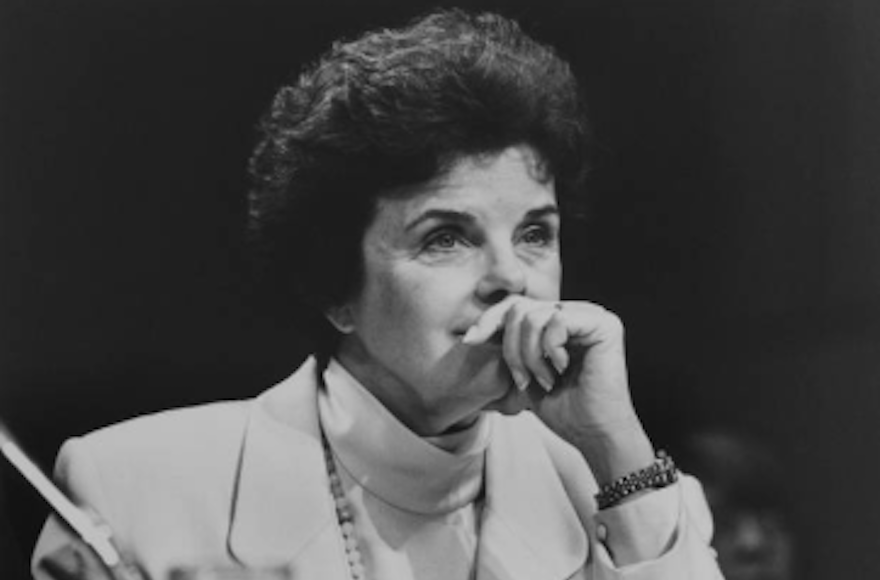A number of key congressional races across the country are drawing considerable attention as well as financial assistance from Jewish activists concerned about the makeup of the next Congress.
In the Senate, where Democrats currently hold 23 of the 35 seats up for re-election, party control is up for grabs.
For the Republicans to wrest control, they need to pick up a total of seven seats, a feat Republicans acknowledge is unlikely, but not impossible.
Although the president’s party traditionally suffers losses in midterm elections, a significant defeat for the Democrats this time around could pose major obstacles for President Clinton’s agenda for the next two years.
Among the most vulnerable incumbents are two of 10 Jewish senators serving on Capitol Hill.
Both senators, Frank Lautenberg (D-N.J.) and Dianne Feinstein (D-Calif), have been heavily supported by the Jewish community for their popular positions on foreign policy and domestic issues.
Feinstein is engaged in the political battle of her life, running in a virtual dead heat against challenger U.S. Rep Michael Huffington, a Texas millionaire who has spent over $10 million of his own fortune on the campaign.
A member of the Senate Appropriations Committee, Feinstein also sits on the Foreign Operations Subcommittee, where the foreign aid package, including Israel’s annual package of $3 billion, originates.
The California race is one of a handful in which religion, and specifically Judaism, has been raised as an issue.
‘SPECIAL OBLIGATION’ TO SUPPORT FEINSTEIN
Early in the campaign, Huffington attacked a fund-raising letter from a Feinstein supporter that targeted Jewish women for having a “special obligation” to support the senator in her election campaign because Huffington “represents everything that is antithetical to us as women and as Jews.”
At the time, Abraham Foxman, national director of the Anti-Defamation League, joined the fray, protesting the fund-raising letter.
In a letter to Democratic activist Lynn Cutler, Foxman wrote: A “candidate’s race, religion, sexual orientation, gender or ethnicity is irrelevant to a determination of whether he or she is qualified for public office.”
In New Jersey, Lautenberg, a longtime Jewish philanthropist and one of Israel’s staunchest allies in the Senate, is facing a tough challenge from Chuck Haytaian, speaker of the New Jersey State Assembly.
Like Feinstein, Lautenberg sits on the Senate Appropriations Committee and its Subcommittee on Foreign Operations.
Haytaian trails in most polls by double digit margins, but surveys show fewer than 35 percent of New Jersey voters want to return Lautenberg to the Senate.
Another of the “minyan” of Jewish senators, Howard Metzenbaum (D-Ohio), is retiring from the Senate.
Metzenbaum’s son-in-law, Joel Hyatt, is trailing Republican Mike DeWine in what observers are calling a toss-up.
In other races around the country, pro-Israel senators such as Jeff Bingamin (D-N.M.), Harris Wofford (D-Pa.) and Chuck Robb (D-Va.), are also in danger of losing re-election bids.
National attention is focused heavily on the Senate campaign in Virginia.
The race has pitted Robb, the incumbent, against Oliver North, who is notorious for his role in the Iran-Contra scandal.
North has garnered significant support, particularly among the religious right and among Republican leaders anxious to see their party gain control of the Senate.
One of a handful of races in which the religious right has played a significant role this election cycle, the Virginia race is currently too close to call.
Because of its prominence and publicity, the outcome of the battle for the Virginia senate seat could have significant implications for the growing power of the religious right, according to Jewish and other observers.
On the other side of the Capitol, the outlook for the House of Representatives, with its current 88-seat Democratic majority, is also uncertain.
With all 435 members running for re-election, most observers expect there will be more Republicans in the House next year.
Among the House races being closely watched by Jewish activists is one involving U.S. Rep. Nita Lowey (D-N.Y.), who has emerged as a significant player on foreign aid.
Lowey is facing a stiff challenge from Republican Andrew Hartzell, an attorney. She is one of many Jewish House members facing tough re-election battles.
Another is U.S. Rep. Marjorie Margolies-Mezvinsky (D-Pa.), who is facing a difficult challenge from John Fox, a Jewish Republican whom she narrowly defeated in 1992.
Other Jewish candidates, including Sam Gjedenson (D-Conn.), Lynn Schenk (D-Calif.), Eric Fingerhut (D-Ohio) and Herb Klein (D-N.J.) are also in danger of losing in November.
Among the non-Jewish candidates who have been supported by Jewish activists because of their pro-Israel stances and because of their potential to rise in the congressional ranks include Constance Morella (R-Md.), Larry LaRocco (D-Idaho) and Scott Klug (R-Wisc.), all of whom are facing uncertainty at the polls.
Other tough races where Jewish PAC money is flowing to incumbents who sit on key committees include Martin Frost (D-Texas), Charles Taylor (R-N.C.) and Ronald Coleman (D-Texas).

Help ensure Jewish news remains accessible to all. Your donation to the Jewish Telegraphic Agency powers the trusted journalism that has connected Jewish communities worldwide for more than 100 years. With your help, JTA can continue to deliver vital news and insights. Donate today.
The Archive of the Jewish Telegraphic Agency includes articles published from 1923 to 2008. Archive stories reflect the journalistic standards and practices of the time they were published.




